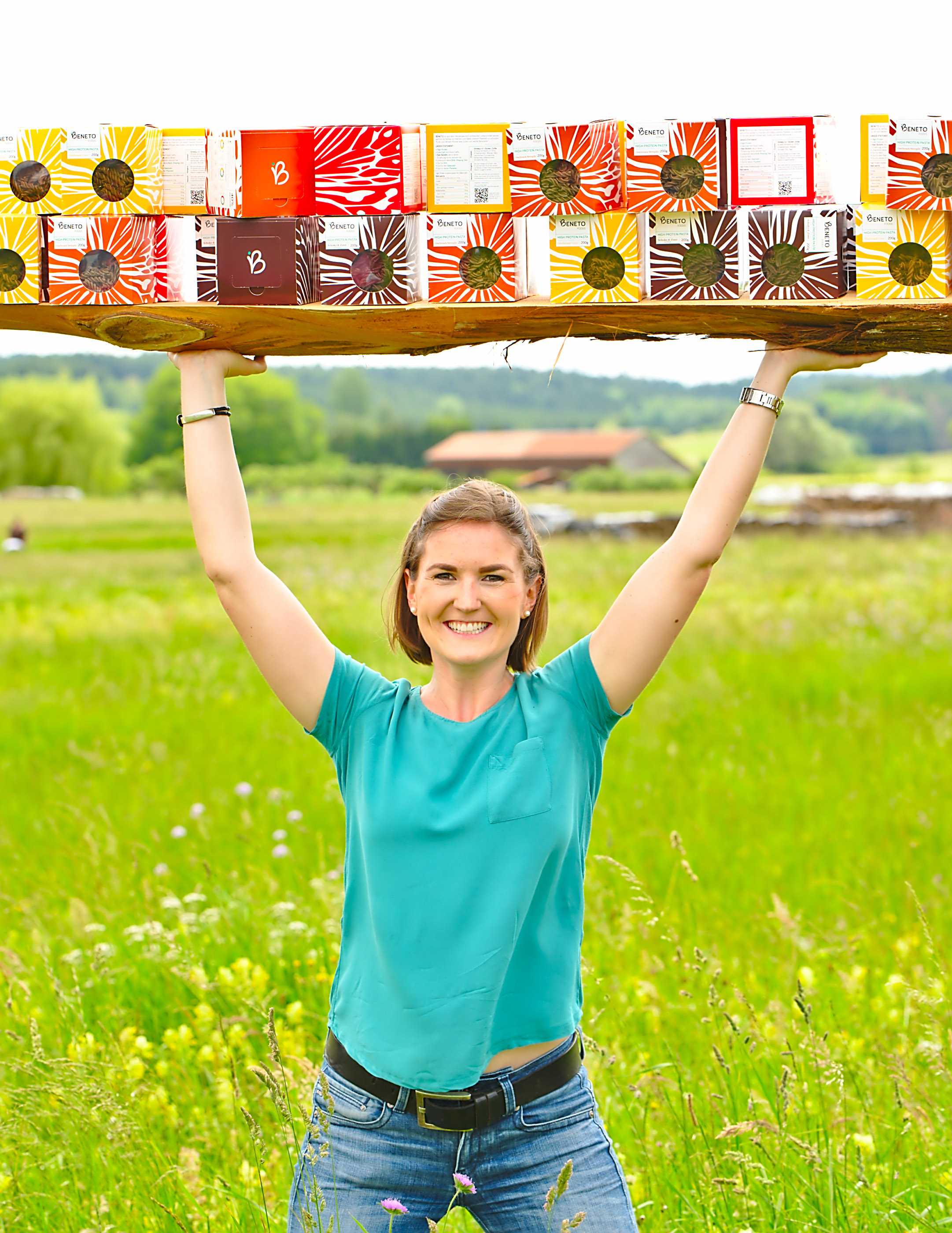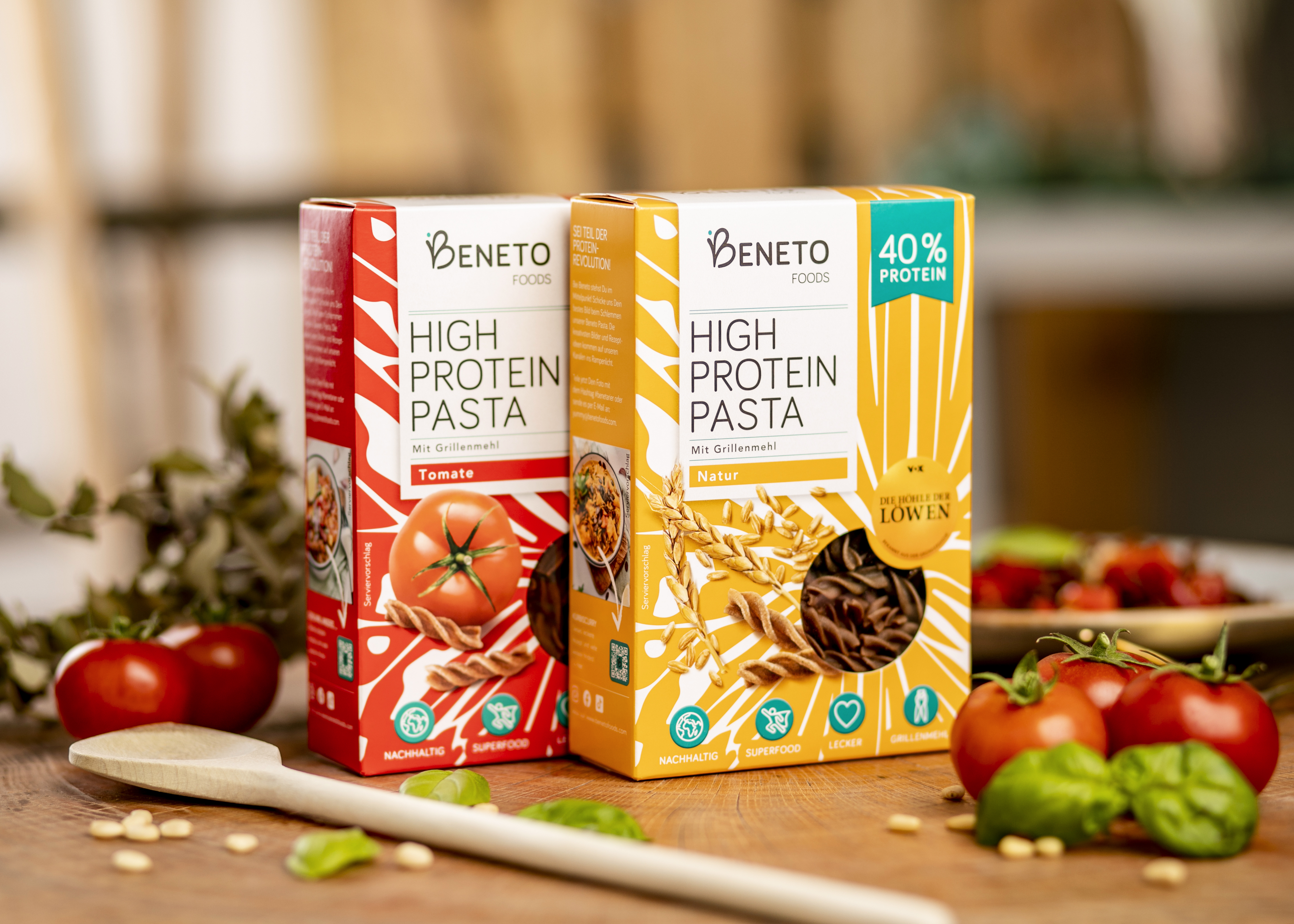Main navigation
Insect pasta: eating healthily and improving the world at the same time
Insects on the dinner plate? Some people instantly dismiss the idea. Wrongly so, because in terms of animal welfare, ecological footprint and healthy nutrition, insect foods are much better than all other animal foods and are produced in a more controlled way than many a steak or sausage. The fact that they can also taste really good is proven by the start-up Beneto Foods from Albstadt, which has developed protein-rich pasta in various flavours using cricket flour.

Insects as an integral part of the human diet have a long tradition: thanks to cave paintings, we know they were eaten in the Stone Age. Of course, one can argue that in order to survive back then, it didn’t pay to be picky. However, even today insects are a staple food item for two billion people in many countries across the world, including in Africa, South America, Asia and Australia.1) So not eating insects is just part of our western culture. And this is something that should be carefully reconsidered in the future.
Why? Firstly, selfishly thinking of the good they can do us: they are extremely valuable foodstuffs that are high in proteins, vitamins and minerals. Secondly, eating insects also benefits animal husbandry: as warm-blooded swarm creatures that like to gather with conspecifics in a confined space, insects can be cultivated in a species-appropriate way, without hormones and antibiotics. This is a complete contrast to the conventional mass livestock farming of mammals, which is usually not species-appropriate. And thirdly, insects can be produced with a much smaller ecological footprint than other animal foods: an insect farm requires around 2,000 times less water and 200 times less space than livestock farming, while at the same time emitting 100 times less CO2. Using residual feeding materials - such as dry bread from bakeries, various press cakes or juice pomace - and waste heat to operate the insect farm, makes breeding insects extremely cost-efficient and climate-neutral in the sense of a circular economy. Moreover, the feed insects are given does not compete with foodstuff consumed by humans.
Everyone eats insects - voluntarily or involuntarily

Nevertheless, the disgust factor still remains, because many people probably still have in mind the traditional image of insects as pests. However, these slow starters may be persuaded to change once they know that edible insects are produced in Germany in a controlled way following very high quality standards and are only approved as food by the EU after strict safety testing. Insects produced in this way in Germany include, to date, the mealworm and buffalo worm (larvae of the flour beetle (Tenebrio molitor)), the glossy black lesser mealworm (Alphitobius diaperinus), the migratory grasshopper (Melanoplus sanguinipes) and the house cricket (Acheta domesticus). In addition, many of us probably don't realise that we involuntarily ingest quite a large number of insects in our diets anyway - several hundreds of grammes per year, notably with coffee, chocolate, flour and some varieties of frozen vegetables and coloured foods. For this reason, a few years ago the U.S. Food and Drug Administration (FDA) set a legal threshold of insects in foods before they are considered contaminated.
So there are many plus points for using insects as food for humans, as Lara Schuhwerk realised. Four years ago, she therefore founded the insect food start-up Beneto Foods almost straight from the lecture hall. The then student of economics at the EDHEC Business School in France, who pursued a vegan lifestyle, developed the complete business plan for the production and marketing of insect noodles in her master's thesis. Initially only on paper, but the 'Insect Lady', as she was quickly dubbed by fellow students, was so fascinated by the idea that she put it into practice: just a few months after graduating, she registered the sole proprietorship in Albstadt, a city in the south of Baden-Württemberg.
Covid put the brakes on the company’s upward trajectory – at least initially
The search for suitable colleagues proved much more difficult. Fellow students who would have liked to join her were not eligible for work permits in Germany. "I simply couldn't find any co-founders in southern Germany. So I was faced with deciding whether to choose a safer, traditional career path or set up a company on my own," reports Schuhwerk. "But had I chosen the former, I would probably always have wondered what would have happened if I had dared to set up the company. And that was one of the reasons why I took the risk and started a company on my own."
Fortunately, she chose the second option, as the insect noodles from Beneto Foods have since become a huge success. But the road was quite rocky. In order to turn her idea into reality, the company founder worked twelve hours a day at her desk in the hallway of Technologiewerkstatt Albstadt and waited tables in the evenings to fulfil her dream of self-employment. Just a year after founding the company, she sold her first 250 kg of insect pasta - financed by herself. This batch completely sold out in just three months. Schuhwerk started a crowdfunding campaign to enable her to produce the second batch. This was highly successful and exceeded the funding goal by 200 percent. However, in order to scale up her idea, she needed further investment. She successfully acquired further funds in May 2020 through the commitment of Formula 1 world champion Nico Rosberg in the ‘Höhle der Löwen’ (German equivalent of Dragon’s Den). However, the Coronavirus pandemic temporarily halted the rise of the start-up.
"We had zero sales for three months, and with a heavy heart I had to part with my two female employees whom I had just hired," says Schuhwerk. She used the time for optimisation and scaling, founding the subsidiary Beneto Farm UG in early 2021 with the help of a twelve-month EXIST Business Start-up Grant, a relaunch involving new types of sustainable packaging. The pasta is currently sold in two varieties via the company's online shop. "Although I have already received many offers from food retailers, I decided against selling our products in supermarkets as insect foods are not yet suitable for the mass market," she says . "We still have some homework to do on that, such as driving down the price and continuing to work on sensory technology."
Several pasta varieties - handmade and with regional ingredients
The insect pasta in the form of fusilli with 40 percent protein content is handmade in a factory in southern Germany. Besides the cricket flour, the pasta also contains organic vegetables and cereals. It comes in two varieties: plain and tomato flavoured: "I thought that this might make people less reluctant to try the insect pasta," says Schuhwerk.

Right from the word go, Schuhwerk was particularly keen to keep the supply chains short. The crickets are therefore purchased from a company in Schnürpflingen near the city of Ulm, and the spelt from a company in the city of Horb. The company's own breeding facility is currently under construction. The goal is to become Germany's first fully automated cricket farm - cost-efficient and climate-neutral. "We want to produce the crickets ourselves in accordance with the highest quality standards, so that the customer knows where the insects come from and what they are fed ," explains Schuhwerk. "The crickets multiply exponentially when they are doing well. That's hugely important to us. We consider the insects as livestock - not as pests - and want to introduce animal welfare criteria. In so doing, we are deliberately choosing to set an example that stands in clear contrast to the questionable mass farming of mammals."
Schuhwerk hopes to launch a prototype in autumn 2022, with the expectation of having a large-scale insect farm in place within the next five to six years. Until then, the farm will be operated as a modular container building and can be connected as regional upcycling to biogas plants, for example. A pilot partner for this already exists. "We're also flirting with the idea of working with a chicken farm," she reveals. "This would have the further benefit of eliminating the use of soy. We hope to have the roadmap for this venture ready by the end of this year."
Beneto also wants to expand the product range to include snacks - a bread mix already exists. Studies are currently being conducted for this purpose at the University of Hohenheim. Another step towards what is "good for us and for the planet," as Schuhwerk puts it.
References:
1) Food and Agriculture Organization of the United Nations (FAO): Der Beitrag von Insekten zu Nahrungssicherung, Lebensunterhalt und Umwelt. https://www.fao.org/3/i3264g/i3264g.pdf
2) Food Defect Levels Handbook https://www.fda.gov/food/ingredients-additives-gras-packaging-guidance-documents-regulatory-information/food-defect-levels-handbook